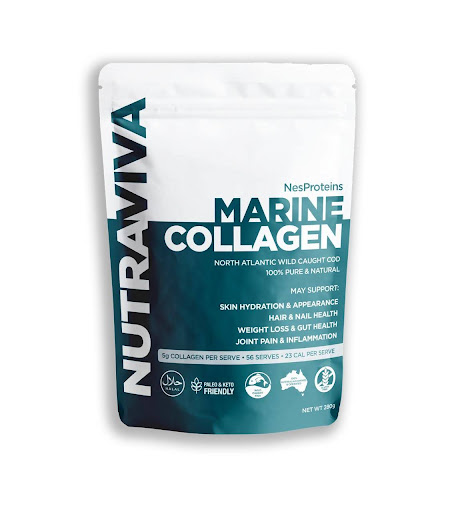Collagen protein has become one of the most talked-about nutrients in the health and beauty world. From skincare products to supplements, everyone is chasing this “youth protein” – and for good reason. Collagen is the most abundant protein in the human body, responsible for keeping our skin firm, joints flexible, and bones strong.
But as we age, our natural collagen production decreases – leading to wrinkles, weak joints, and dull skin. The good news? You can restore and maintain collagen levels naturally through food and supplements. Let’s explore everything you need to know about collagen protein, its benefits, sources, and how to use it effectively.
What Is Collagen Protein?
Collagen is a structural protein that forms the framework of your body’s connective tissues – including your skin, bones, cartilage, muscles, tendons, and ligaments. It acts like the “glue” that holds your body together.
There are more than 28 types of collagen, but the most important ones for health are:
- Type I: Found in skin, bones, and tendons (for firmness and strength)
- Type II: Found in cartilage (supports joints)
- Type III: Found in muscles, organs, and arteries
- Type IV & V: Found in layers of skin, hair, and placenta
Together, these collagen types maintain your body’s flexibility, strength, and youthful appearance.
How Collagen Works in the Body
Collagen is made from three key amino acids – glycine, proline, and hydroxyproline. These form a triple-helix structure that gives collagen its strength and flexibility.
When you consume collagen-rich foods or supplements, your body breaks it down into amino acids, which are then used to rebuild skin cells, joint tissue, and bone structure.
Natural Sources of Collagen Protein
Your body can produce collagen naturally if it gets the right nutrients. Here are some natural sources that support collagen formation:
Animal-Based Sources
- Bone broth (rich in collagen and gelatin)
- Chicken skin & fish skin
- Beef & pork bones
- Egg whites (contain proline and glycine)
Plant-Based Sources (support collagen production)
- Citrus fruits (vitamin C for collagen synthesis)
- Berries (antioxidants protect collagen from damage)
- Leafy greens (vitamin A and chlorophyll)
- Nuts & seeds (zinc and copper help collagen formation)
Collagen Supplements
If your diet doesn’t provide enough collagen, collagen supplements can help. These come in the form of powders, capsules, or drinks, usually made from bovine (cow), marine (fish), or chicken sources.
The most effective form is hydrolyzed collagen (collagen peptides) – it’s easily absorbed and utilized by the body. You can mix it into smoothies, coffee, or even soups without changing the taste.
Top 7 Benefits of Collagen Protein
1. Improves Skin Elasticity and Hydration
Collagen keeps your skin firm, smooth, and youthful. Regular intake reduces wrinkles, dryness, and sagging by restoring the skin’s natural structure. Many people notice visible improvements within 4–8 weeks of using collagen supplements.
2. Supports Joint Health
Collagen helps maintain cartilage – the tissue that cushions your joints. Studies show collagen supplementation can reduce joint pain, stiffness, and inflammation, especially in athletes or people with arthritis.
3. Strengthens Hair and Nails
Collagen provides amino acids that are essential for strong hair and nails. It helps reduce nail breakage and promotes thicker, shinier hair growth naturally.
4. Boosts Muscle Mass and Recovery
Since collagen is rich in glycine and proline, it supports muscle growth and recovery after exercise. It also improves strength and endurance when combined with regular workouts.
5. Promotes Bone Health
Collagen forms the foundation of bone structure. Consuming collagen protein can improve bone density and reduce the risk of fractures, especially in older adults.
6. Improves Gut Health
Collagen helps repair and strengthen the intestinal lining, preventing issues like leaky gut syndrome and supporting better digestion.
7. Supports Heart and Brain Function
Collagen provides structure to arteries and blood vessels, improving circulation. The amino acid glycine also supports brain relaxation and better sleep.
How to Use Collagen Protein Daily
There are many easy ways to add collagen to your diet:
- Mix collagen powder into your morning coffee or tea
- Add to smoothies or protein shakes
- Stir into soups, stews, or oatmeal
- Use bone broth as a daily drink
- Take collagen capsules with meals
Pro Tip: Combine collagen with vitamin C-rich foods (like lemon or orange juice) – vitamin C helps your body absorb collagen more effectively.
Possible Side Effects
Collagen is generally safe for most people. However:
- Those with allergies to fish or eggs should avoid marine-based collagen.
- Some people may experience mild bloating or heartburn initially.
- Always buy from trusted, clean-label brands that use organic or grass-fed sources.
Consult your doctor if you are pregnant, nursing, or have medical conditions before taking supplements.
Collagen vs. Other Proteins
Unlike whey or plant protein, collagen doesn’t contain all essential amino acids – it’s not a “complete protein.” However, it excels in tissue repair, joint health, and skin rejuvenation, making it a perfect complement to your daily protein intake.
| Feature | Collagen Protein | Whey Protein |
| Main Function | Skin, joints, gut, recovery | Muscle growth |
| Digestibility | Very high | Moderate |
| Amino Acids | Glycine, proline, hydroxyproline | Leucine, isoleucine, valine |
| Ideal For | Anti-aging, recovery, joint care | Muscle building, fitness |
Final Thoughts
Collagen protein is more than a beauty supplement – it’s a vital building block for your entire body. Whether you want glowing skin, stronger joints, or better overall health, collagen offers natural, long-term benefits that no synthetic product can match.

